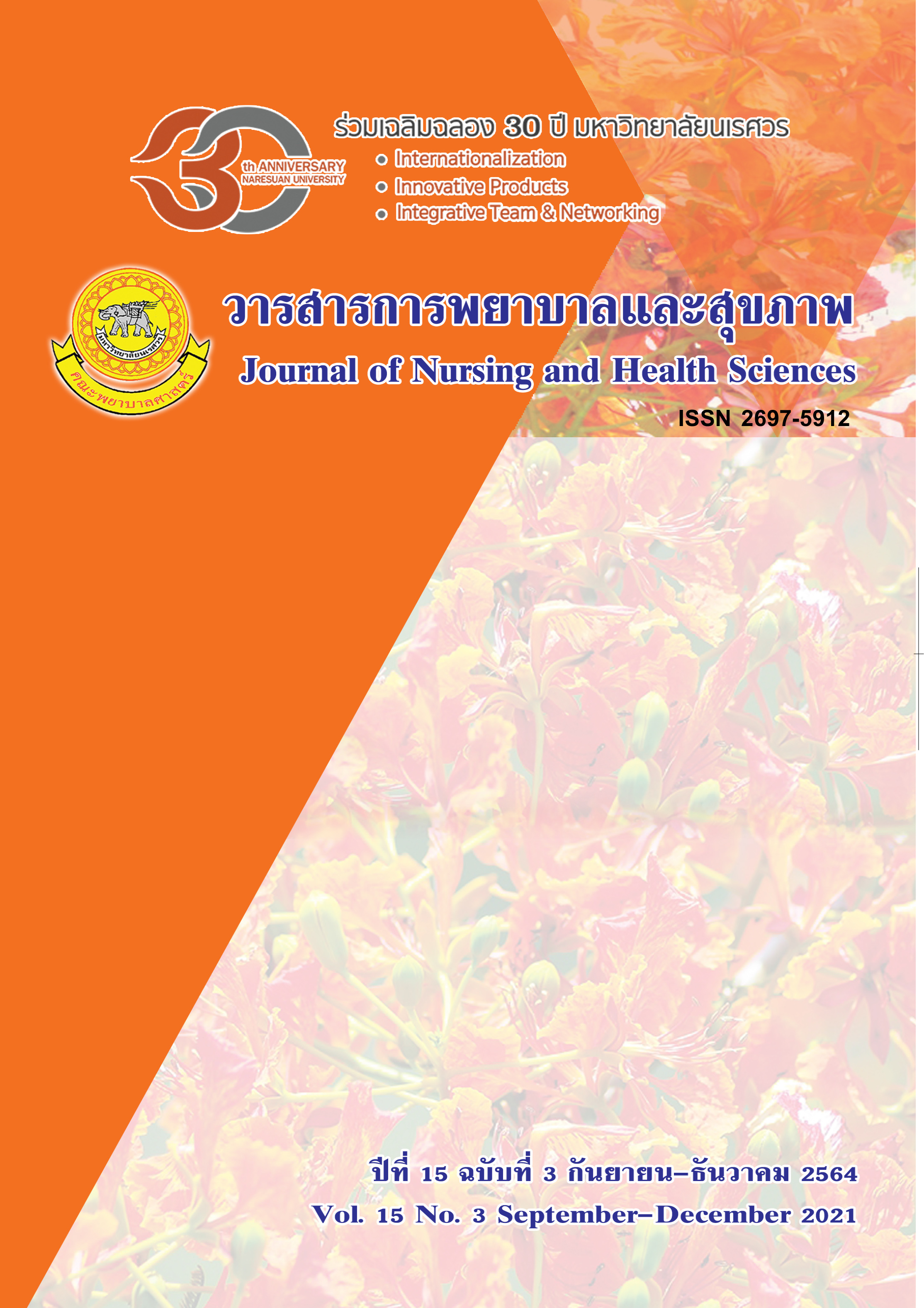ปัจจัยทำนายพฤติกรรมการให้บริการช่วยเลิกบุหรี่ของพยาบาลชุมชนในจังหวัดนครปฐม
Main Article Content
บทคัดย่อ
การให้บริการช่วยเลิกบุหรี่ในชุมชน ช่วยให้ประชาชนมีการเปลี่ยนแปลงพฤติกรรมการสูบบุหรี่ในทิศทางที่ดีขึ้น พยาบาลเป็นบุคลากรสุขภาพที่ถูกคาดหวังว่าจะให้บริการช่วยเลิกบุหรี่ได้มากที่สุด เนื่องจากมีความใกล้ชิดกับประชาชนจำนวนมาก การวิจัยแบบการหาความสัมพันธ์เชิงทำนาย ครั้งนี้มีวัตถุประสงค์เพื่อศึกษาปัจจัยทำนายพฤติกรรมการให้บริการช่วยเลิกบุหรี่ของพยาบาลชุมชน จังหวัดนครปฐม เก็บรวบรวมข้อมูลในพยาบาลที่ปฏิบัติงานในโรงพยาบาลส่งเสริมสุขภาพตำบล จังหวัดนครปฐม จำนวน 88 คน ด้วยแบบสอบถาม ตรวจสอบความเที่ยงตรงของเนื้อหา ได้ค่าดัชนีความเที่ยงตรง (Content validity index: CVI) ของแบบสอบถามทั้งฉบับ เท่ากับ 0.98 โดยค่าดัชนีความเที่ยงตรงของแบบสอบถามด้านความรู้ ทัศนคติ ความเชื่อมั่นในความสามารถของตนเอง ในการให้บริการช่วยเลิกบุหรี่ และการให้บริการช่วยเลิกบุหรี่เท่ากับ 1.00, 0.98, 0.97, และ 0.97 ตามลำดับ และหาค่าความเชื่อมั่นของแบบสอบถามด้านความรู้ในการให้บริการช่วยเลิกบุหรี่ ได้ค่า KR20 เท่ากับ 0.77 ค่าความเชื่อมั่นของแบบสอบถามด้านทัศนคติ ความเชื่อมั่นในความสามารถของตนเองในการให้บริการช่วยเลิกบุหรี่ และพฤติกรรมการให้บริการช่วยเลิกบุหรี่ โดยการหาค่าสัมประสิทธิ์แอลฟาครอนบาค (Cronbach’s alpha coefficient) ซึ่งมีค่าเท่ากับ 0.75, 0.91, และ 0.94 ตามลำดับ วิเคราะห์ข้อมูลด้วยโปรแกรมสำเร็จรูปโดยใช้สถิติพรรณนา ได้แก่ การแจกแจงความถี่ ร้อยละ ค่าเฉลี่ย ส่วนเบี่ยงเบนมาตรฐาน และใช้สถิติเชิงอนุมาน เพื่อหาปัจจัยทำนายพฤติกรรมการให้บริการช่วยเลิกบุหรี่ ด้วยการวิเคราะห์ถดถอยลอจิสติกเชิงพหุ (Multiple logistic regression) ผลการศึกษาพบว่า พยาบาลที่ปฏิบัติงานที่โรงพยาบาลส่งเสริมสุขภาพตำบลมีพฤติกรรมการให้บริการช่วยเลิกบุหรี่ในระดับดีถึงดีมาก และพบว่าความเชื่อมั่นในความสามารถของตนเอง (Adjusted odds ratio = 1.177, p-value = 0.001) และประสบการณ์การได้รับการอบรมเกี่ยวกับการให้บริการช่วยเลิกบุหรี่ (Adjusted odds ratio = 14.151, p-value = 0.017) สามารถทำนายพฤติกรรมการให้บริการช่วยเลิกบุหรี่ของพยาบาลชุมชนได้ ร้อยละ 39.9 (Model Chi-Square = 28.385, p-value < .001) ผลการศึกษาเสนอแนะว่าสำนักงานสาธารณสุขจังหวัดควรมีนโยบายที่ต่อเนื่องเกี่ยวกับการให้บริการช่วยเลิกบุหรี่ในชุมชนที่สามารถดำเนินการได้ในระดับโรงพยาบาลส่งเสริมสุขภาพตำบล อีกทั้งสนับสนุนให้พยาบาลชุมชนได้รับการอบรมการให้บริการช่วยเลิกบุหรี่ เพื่อเสริมสร้างความเชื่อมั่นในความสามารถของตนเองในการให้บริการช่วยเลิกบุหรี่
Article Details

อนุญาตภายใต้เงื่อนไข Creative Commons Attribution-NonCommercial-NoDerivatives 4.0 International License.
เอกสารอ้างอิง
Bandura, A. (1977). Self-efficacy: Toward a unifying
theory of behavioral change. Psychological
Review, 84(2), 191-215. from https://doi.org/10.
/0033-295X.84.2.191.
Banu, R. M. (2018). Nursesattitude and self-efficacy
in smoking cessation care to hospitalized patients.
International Archives of Substance Abuse and
Rehabilitation, 1(1).1:001. doi:10.23937/IASAR-
/1710001.
Best, W. J. (1981). Research in education (4th ed.).
New Jersey: Prentice-Hall.
Bloom, B. S., Hastings, T. J., & Madaus, G. F. (1971).
Hand book on formative and summative evaluation
of student learning. New York: McGraw-Hill.
Bundhamcharoen, K., Aungkulanon, S., Makka, N., &
Shibuya, K. (2016). Economic burden from
smoking-related diseases in Thailand. Tobacco
Control, 25(5), 532-537. [In Thai].
Bureau of Tobacco Control, Department of Disease
Control, Ministry of Public Health. (2016).
Second nation strategic plan for tobacco control
-2019. Retrieved 24 October 2020 from http://
e-lib.ddc.moph.go.th/pdf/material_415/material_
pdf.
Center for Continuing Pharmaceutical Education, The
Pharmacy Council. (2018).Academic conference
project "drug stores volunteer to quit smoking".
[Internet]. Retrieved 24 October 2020 from https:/
/ccpe.pharmacycouncil.org/index.php? [In Thai].
Chaichana, J., &Prachusilpa, G. (2018).Astudy of
professional nurse roles in sub-district health
promotion hospital. Journal of The Royal Thai
Army Nurses,19(Supplement), 193-202. [In Thai].
Chatdokmaiprai, K., Kalampakorn, S., McCullagh,
M., Lagampan, S., & Keeratiwiriyaporn, S.
(2017). Factors predicting the provision of
smoking cessation services among occupational
health nurse in Thailand. Workplace Health
Safety, 65(6), 253-261.doi.org/10.1177/21650799
0661.
Green, L. W., & Kreuter, M. W. (2005). Health program
planning: an educational and ecological approach
(4th ed.). New York: Emily Barrosse.
Hosmer, D.W., Lemeshow, S., & Sturdivant, R. X.
(2013). Applied logistic regression (Third Edition).
United States of America: John Wiley & Sons.
DOI:10.1002/9781118548387.
Huang, C., Guo, C., Yu, S., Feng, Y., Song, J., Eriksen,
M., et al. (2013). Smoking behaviors and cessation
services among male physicians in China:
evidence from a structural equation model.
Tobacco control, 22(Suppl 2), ii27-ii33. Retrieved
August 2021 from https://doi.org/10.1136/
tobaccocontrol-2012-050884.
Marquez, V. P. (2021). An ominous fact on World No
Tobacco Day-: Smoking kills more people than
COVID-19. Retrieved2 August 2021 from https://
blogs.worldbank.org/health/ominous-fact-worldno-tobacco-day-2021-smoking-kills-morepeople-covid-19.
Martinez, C., Castellano, Y., Andres, A., Fu, M., Anton,
L., Ballbe, M., …Fernandez, E. (2017). Factors
associated with implementation of the 5A's
smoking cessation model. Tobacco Induced
Diseases, 15(41), 1-11. DOI:10.1186/s12971-017-
-7.
Nakhon Pathom Provincial Public Health Office is
moving forward to drive a smoke-free province.
(2021, August 31). Matichon on line. Retrieved 4
September 2021 from https://www.matichon.co.th/
news-monitor/news_2915018. [In Thai].
Pimroon, S., Pungbangkadee, R., Jewpattanakul, Y.,
& Chuetaleng, T. (2021). Factors influencing
tobacco controlpractice among the registered
nurses who used to attending as a leader of the
nursing student smoke-free Thai society club.
Journal of The Royal Thai Army Nurses, 22(1),
-225. [In Thai].
Praingam, B., Praingam, S., & Kittipichai, W.(2019).
Predicting factors the provision of smoking
cessation services among dentists. Journal of
Public Health, 49(1), 81-94. [In Thai].
Preechawong, S. (2007). Nurses and WHO framework
convention on Tobacco Control. Journal of
Nursing Science Naresuan University, 1(2), 9-18.
[In Thai].
Preechawong, S., Vathesathogkit, K., & Suwanratsamee,
S. (2011). Effects of tobacco cessation counseling
training on Thai professional nurses' self-efficacy
and cessation counseling practices. International
Journal of Nursing Research, 15(1), 3-12.
Thai Health Promotion Foundation. (2015). New strategies
create offensive lines "Local Communities
Smoke-Free "2020. Retrieved 24 October 2020
from https://www.thaihealth.or.th/Content/29046.
[In Thai].
Tobacco Control Research and Knowledge Management
Center [TRC]. (2019). Statistic report: Thailand
Tobacco Consumption 2019. Retrieved 24
August 2021. from https://www.trc.or.th/th/media/
attachments/2020/07/19/. [In Thai].
World Health Organization (2018). Tobacco. Retrieved
October 2020 from https://www.who.int/healthtopics/tobacco.
World Health Organization.(2021). Tobacco: key facts.
Retrieved 2 August 2021 from https://www.who.
int/news-room/fact-sheets/detail/tobacco.
Zhang, L., Chen, Y., Lv, Y., Yang, X., Yin, Q., Bai,
L., … Zhao, Y. (2019). The perception and
intervention of internship nursing students
helping smokers to quit: A cross-sectional studyin
Chongqing, China. International journal of
environmental research and public health, 16(20),


